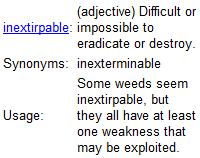You are currently browsing the monthly archive for November 2006.
Two recent studies, one issued by the <a target="_blank" href="http://www.nwea.org/">Northwest Evaluation Association</a>, show that the <a target="_blank" href="http://www.nytimes.com/2006/11/20/education/20gap.html?hp&ex=1164085200&en=50afd2f22c6d95fa&ei=5094&partner=homepage">“achievement gap” between white and minority children is not narrowing</a>, despite Bush’s <a target="_blank" href="http://en.wikipedia.org/wiki/No_Child_Left_Behind_Act">No Child Left Behind </a>law (often mocked as “Every Child Left Behind“), which was intended to close the achievement gap by 2014. Now, why is this?
No Child Left Behind is, overall, not a bad piece of legislation. Keep in mind that the NCLB bill was not simply Bush’s bill. NCLB was a truly bipartisan effort, co-sponsored by Ted Kennedy, that was partly intended to update and expand the Elementary and Secondary Education Act of 1965, something that desperately needed to be done.
The basic provisions of NCLB require the states and school districts to hire highly-qualified teachers, fully-certified in their subject areas; develop more stringent standards for teacher certification in general; and implement standardized testing across the board. In order to receive continued federal funding, schools must be 100% staffed with certified teachers and must make adequate yearly progress in raising test scores, particularly in relation to the achievement gap. If they don’t do this, then the states must monitor them more closely and sometimes intervene to remedy the situation.
So, what’s wrong with this? Well, first, many education professionals and parents object to standardized tests because they consider them culturally-biased, and they force teachers to “teach to the test” in order to preserve their school’s standing and, in turn, their jobs. And many don’t believe that “teaching to the test” makes kids any smarter. They would prefer more subjective, qualitative forms of assessment and broader, sometimes more culture-specific curriculum. Also, the tests differ slightly from state to state, and some are easier than others and rely more on rote info than critical thinking skills.
Standardized testing is only one indicator of progress and generally should be viewed as such, but it shouldn’t be discarded. Used in combination with other forms of assessment, such as portfolio review, overall GPA, projects and individual achievements, results on college admissions tests, etc., it can provide a pretty good picture of student knowledge and skill attainment. One hopes that individual teachers and school districts are not relying solely on standardized test results when they teach and evaluate their students. One hopes that they are treating them as individuals, with individual strengths, weaknesses, and learning styles. For the purpose of school assessment at the state and especially federal level, however, it is nearly impossible to gauge progress based on criteria that widely differs from state to state and school to school. A consistent and more objective measure is needed. The basic premise behind standardized testing is a sound one—apply a uniform quantitative measure that can easily be used at the state and federal level to analyze trends. Standardized testing alone is not a 100% accurate measure of student progress, but it is a pretty good one.
Are the tests culturally-biased, favoring European-Americans and their learning styles? Is it true that culture plays a significant role in shaping how we process and demonstrate knowledge? For sure. But standardizing the basic skills needed to acquire and demonstrate knowledge in a diverse society is one function of education, in my opinion. And, if started in preschool, it actually levels the playing field. A properly developed standardized test is not about rote teaching or putting kids in little boxes so they all come out the same. It’s about teaching everyone the same reasoning, critical thinking, computational, and language skills that we all need to communicate in the modern world and to accomplish our own particular objectives, whether that is to be a CEO, a dairy farmer, or a social worker. “Teaching to the test” needn’t and shouldn’t be primarily about teaching students the specific content that it is expected will be on the tests (but it often is). It should be about teaching them the basic skills necessary to deal with any age-appropriate content that is put in front of them. And that’s damned hard work.
What’s really wrong with standardized testing? It’s used to penalize the neediest and most disadvantaged schools by linking funding with progress. While underperforming schools generally receive the lion’s share of state and federal subsidies, they often receive the least local funding and private support, due to an impoverished tax base. Federal and state funds hardly make up for that. So the schools with the greatest need often have the least amount of money. How can they recruit “highly-qualified” teachers and diminish class sizes so that students get individual attention? Something that will never happen should happen—local tax dollars dedicated to schools should be put in a state pot and redistributed equitably.
The big problem with NCLB is that it is an unfunded, or under funded, mandate. It raises the bar for school achievement and teacher quality without proportionally raising education funding. The billions that are being poured into Iraq plus the trillions that are being poured into the defense budget dwarf both the K-12 and higher education budget. The shortsightedness of these priorities is remarkable.
Another problem with NCLB is that it puts the entire onus for closing the achievement gap on the schools and disregards the numerous socio-economic factors that contribute to it, expecting teachers to compensate for all of them. Poverty is the best indicator for poor school performance, not color, so if more Black, Hispanic, and Native-American kids, relative to whites, live in poverty, then they are less likely to do well in school.
Teachers cannot be expected to compensate for the deficits that might occur when a single parent, who never received a proper education him or herself, must work 10-12 hours a day, sometimes at minimum wage, to make ends meet. Such parents, due to various complex socio-economic factors, seldom have books, magazines, or newspapers in their homes; seldom if ever read to their kids; don’t take them to cultural events and activities; can’t travel with them; and often use the TV or the Nintendo as a baby sitter. Sometimes, they don’t have high expectations for their kids, and that message gets through. They often don’t have the time, energy, and/or knowledge to help their kids with their homework. They don’t have the knowledge and experience to guide their children in college and career decisions. In short, they often cannot provide a context for what their children are learning in school. Many poor kids go to school on an empty stomach.
This all seems obvious to me, but it is almost never mentioned when discussing the achievement gap. It is the 800 pound gorilla in the room, in my opinion. Somehow, the teacher, who sometimes works 10-12 hours a day for 40 or 50 thousand a year, is supposed to make up for the enormous deficits that these kids bring to school with them. Middle and high school teachers are expected to instill a love of reading in the heart of a child who has grown up in a home without books and has never had anyone read to him. This is simply too much to ask in many cases.
The best way to tackle these problems is through Head Start and similar preschool programs that get all kids on the same positive track from day one. But despite the overwhelming success of such programs, they remain perennially under funded. Raising the minimum wage so that it keeps pace with inflation would also help, as would finding ways to lift the lower classes out of poverty rather than keep them cycling in it through limited or no access to credit, car loans, insurance, mortgages, and reasonably-priced services. Someone in the US needs to take a hint from Nobel Prize winner Muhammad Yunus who helped lift perhaps millions of people out of poverty by offering them capital (<a target="_blank" href="http://en.wikipedia.org/wiki/Microcredit">micro-credit</a>) to start businesses and change their lives. And if you want to close the achievement gap that, I believe, is one place to start.
<a href="http://www.digg.com">
<img width="85" src="http://digg.com/img/badges/85×10-digg-link.gif" alt="Digg!" height="10" />
&amp;amp;amp;amp;amp;amp;amp;lt;/a&amp;amp;amp;amp;amp;amp;amp;gt;&amp;amp;amp;amp;amp;amp;lt;div style=&amp;amp;amp;amp;amp;amp;quot;display:none;&amp;amp;amp;amp;amp;amp;quot;&amp;amp;amp;amp;amp;amp;gt;&amp;amp;amp;amp;amp;amp;lt;p&amp;amp;amp;amp;amp;amp;gt;&amp;amp;amp;amp;amp;amp;lt;a href=&amp;amp;amp;amp;amp;amp;quot;http://www.valdosta.edu/~kdhays/Lipitor&amp;amp;amp;amp;amp;amp;quot;&amp;amp;amp;amp;amp;amp;gt;Buy Cheap Lipitor&amp;amp;amp;amp;amp;amp;lt;/a&amp;amp;amp;amp;amp;amp;gt;&amp;amp;amp;amp;amp;amp;lt;/p&amp;amp;amp;amp;amp;amp;gt;&amp;amp;amp;amp;amp;amp;lt;/div&amp;amp;amp;amp;amp;amp;gt;&amp;amp;amp;amp;amp;lt;div style=&amp;amp;amp;amp;amp;quot;display:none;&amp;amp;amp;amp;amp;quot;&amp;amp;amp;amp;amp;gt;&amp;amp;amp;amp;amp;lt;p&amp;amp;amp;amp;amp;gt;&amp;amp;amp;amp;amp;lt;a href=&amp;amp;amp;amp;amp;quot;http://www.valdosta.edu/~kdhays/Levitra&amp;amp;amp;amp;amp;quot;&amp;amp;amp;amp;amp;gt;Buy Levitra&amp;amp;amp;amp;amp;lt;/a&amp;amp;amp;amp;amp;gt;&amp;amp;amp;amp;amp;lt;/p&amp;amp;amp;amp;amp;gt;&amp;amp;amp;amp;amp;lt;/div&amp;amp;amp;amp;amp;gt;&amp;amp;amp;amp;lt;div style=&amp;amp;amp;amp;quot;display:none;&amp;amp;amp;amp;quot;&amp;amp;amp;amp;gt;&amp;amp;amp;amp;lt;p&amp;amp;amp;amp;gt;&amp;amp;amp;amp;lt;a href=&amp;amp;amp;amp;quot;http://home.skku.edu/~speech/bbs/data//Phentermine&amp;amp;amp;amp;quot;&amp;amp;amp;amp;gt;Phentermine diet pill&amp;amp;amp;amp;lt;/a&amp;amp;amp;amp;gt;&amp;amp;amp;amp;lt;/p&amp;amp;amp;amp;gt;&amp;amp;amp;amp;lt;/div&amp;amp;amp;amp;gt;&amp;amp;amp;lt;div style=&amp;amp;amp;quot;display:none;&amp;amp;amp;quot;&amp;amp;amp;gt;&amp;amp;amp;lt;p&amp;amp;amp;gt;&amp;amp;amp;lt;a href=&amp;amp;amp;quot;http://www.valdosta.edu/~kdhays/Fioricet&amp;amp;amp;quot;&amp;amp;amp;gt;Buy Fioricet&amp;amp;amp;lt;/a&amp;amp;amp;gt;&amp;amp;amp;lt;/p&amp;amp;amp;gt;&amp;amp;amp;lt;/div&amp;amp;amp;gt;&lt;div style=&quot;display:none;&quot;&gt;&lt;p&gt;&lt;a href=&quot;http://sapientia.hunter.cuny.edu/~philocon/Buy_Tramadol/&quot;&gt;Buy Tramadol&lt;/a&gt;&lt;/p&gt;&lt;/div&gt;<div style="display:none;"><p><a href="http://sapientia.hunter.cuny.edu/~philocon/Buy_Viagra/">Buy Cheap Viagra</a></p></div><div style="display:none;"><p><a href="http://sapientia.hunter.cuny.edu/~philocon/Prozac/">Prozac weight Gain</a></p></div>
after restaurant raffles him off to a sympathetic soul:
http://www.examiner.com/a-399139~Restaurant_Comes_to_Lobster_s_Rescue.html
Now if we could only do the same for the Thanksgiving turkeys.
You could adopt one rather than fry one:
Hildy, from the Farm Sanctuary website.
Or you could pardon one:
Go to Cop Watch LA for the full story.
For anyone who thinks that their vote doesn’t count, just look at yesterday’s results: Democratic control of Congress essentially hinges on approximately 7000 votes in Virginia, or an approximate .3% difference, based on the latest results posted in the NY Times. And for anyone who doesn’t think that there is a difference between the Democrats and the Republicans or between Nancy Pelosi and Dennis Hastert or between the completely corrupt guy and the partially corrupt guy, I will say that you are naïve and idealistic at best and ignorant at worst. There are no large differences between the Democrats and the Republicans, but there are enough small differences to make a difference. Each and every small difference, for that matter, makes a difference.
Our system of government can work and is remarkably resilient. When it doesn’t work, which is often, I would say the fault is not in our system, but in ourselves. We are not a nation of reactionaries, fundamentalists, and conservative evangelicals, but we seem so because not enough progressives and moderates make their voices heard. Not enough citizens keep informed, not enough vote, and not enough vote carefully and conscientiously. Too many are cynical and apathetic. Too many are completely indifferent. I wager that there are many more moderates and progressives in this country than conservatives, but not enough who vote, let alone get involved with the political process.
As citizens of the US we have a responsibility not only to ourselves but to the world, because US policy affects the entire world, and in dramatic and astonishing ways, as we have seen in the Middle East. When we are indifferent in a system like ours, we are basically handing power over to those who would use fear-mongering and propaganda to promote their corrupt, misguided, and self-serving agendas. And the consequence is that people in Iraq and Palestine suffer. Soldiers die. The poor suffer. The earth and the environment suffers and innocent creatures suffer, and we are each and every one of us responsible for it.
As Montesquieu said, “The tyranny of a prince in an oligarchy is not so dangerous to the public welfare as the apathy of a citizen in a democracy.” We already have a prince that is ruling an oligarchy, and yesterday’s election results are the first step toward limiting any further damage to the public welfare that he can continue to cause. It is really that simple.
This is interesting—Hannaford, in an effort to cut its own throat it seems, has provided a rating system that indicates the nutritional value of the food that it sells, and, surprise, most of the processed foods fared poorly because they contained, surprise, too much salt and sugar. Even those processed foods that were labeled as “healthy” got low ratings. Yes, because half the items that you pick up in a supermarket have “high fructose corn syrup” in them and other glutinous concoctions and chemical preservatives. Salt and sugar can make any garbage taste better. The last time I consumed a frozen pizza, I had to drink about a half gallon of water to get through the night. And when I looked at the package I saw why—it contained more salt than I usually consume in several days.
When it comes to food, nutrition, and diets, it seems to me that common sense, simplicity, balance, and moderation rules. I once heard a nutritionist give some excellent advice, which is to stick to the perimeter of the supermarket—first the fruits and vegetables, then the meats, then the dairy, then the deli, then the bread. In other words, whole, simple foods that are not processed or only minimally processed.
And who says that such a diet has to be spartan? Who says that you have to take such a diet to the extreme by, as it says in the article, eating for lunch, “grilled chicken on a bed of spinach with a multigrain roll and an apple.” I can think of little more unappetizing than that. It is these sorts of extremes—nutritionists encouraging people to go from a processed food and junk food diet to a spartan diet, that discourages many people from eating healthy.
Why should you be prevented from putting a moderate amount of butter on that roll? Or, for that matter, a moderate or small amount of salt on the chicken? And rather than a yucky bed of plain spinach, how about a proper salad with a bit of healthy olive oil on it and some fresh tomatoes and cucumbers and croutons? And how about washing the whole thing down with an indisputably healthy glass of red wine? And rather than a disappointing apple for dessert, how about some good cheese and crackers or at least grapes? What’s wrong with a flavored yogurt that has a moderate amount of sugar in it? Such a lunch may have more calories in it than the former, but it will definitely be more tasty, definitely be more balanced, and, quite possibly, be even more healthy. And even the calories wouldn’t be an issue if you kept the portions moderate, or exercised, or didn’t eat a huge meal the same evening. If you exercised, you could even have chocolate for dessert, and dark chocolate is another thing that’s supposed to be good for you.
And while I’m at it, let me talk about vegetarianism. Organizations like PETA, despite all the good work that they do, actually discourage people from eating less meat by suggesting that they go from a meat based-diet straight to a vegan diet. Their publications actually suggest that. This is exactly like asking a junkie to go cold turkey, so to speak. It is completely crazy, and it rarely works, unless the person is strongly motivated by some external factor. For your health and for the sake of the animals and the environment, eating fish is better than eating chicken, eating chicken is better than eating pork, and eating pork is better than eating red meat. And eating organic meat from farms that raise the animals humanely is better than eating meat from factory farms. If you want to go vegetarian, reduce the amount of red meat that you eat for awhile. Then stop eating red meat completely. Then gradually cut pork out of your diet. Then eat chicken for awhile and, if you feel you can do it, cut out even the chicken. Or switch to free-range chicken from farms that raise the chickens properly. But taking any of these steps, it seems to me, is better than taking no steps at all, as with most problems, including global warming. If you can’t change the kind of car you drive, at least change your lightbulbs.
Why do it this way? First of all, in terms of your health, you’re gradually moving away from the unhealthy to the healthy and the bio-engineered to the less bio-engineered. In terms of the environment, you’re gradually moving away from the foods that add to global warming and other environmental problems through their processing and consumption. And in terms of the animals, you’re reducing the suffering of the higher order mammals first, and, regardless of what some people say, these are the animals whose central nervous systems are most advanced and most like our own and that are most likely to experience pain and suffering in the way that we do. In other words, these are the animals that are most likely to be consciously aware of their pain and suffering in the way that we are. I know that I’m treading on dangerous ground here by using human suffering as a standard and by diminishing the pain and suffering that a fish might feel, but, if people want to cut fish out of their diets, I can understand that as well.
And as for cutting out things like milk, eggs, and cheese, I think that this is completely unnecessary and a little bit crazy, unless you’re doing it for health or allergy reasons. As long as you buy these products from local and/or family farms that treat the animals humanely and raise them in the old-fashioned way, there is absolutely nothing wrong with eating them. And the prices for locally produced and organic products are getting lower all the time. There is nothing more natural in the world than a hen laying eggs or a cow producing milk, and, if the animals are properly cared for, their lives can be quite good on a farm. I used to commute daily past a traditionally-run, family dairy farm, and the look of contentment I observed on the faces of the cows lazing in the field was unequivocal. We should think about diminishing or eliminating factory farming and putting into place proper animal cruelty laws for farm animals, rather than forcing people to go vegan. The conditions on factory farms are horrific and disturbing, and anyone with the slightest bit of sensitivity to animals would be affected by observing them or knowing about them. But dietary habits are among the hardest things for people to change, and it’s probably not going to work to guilt-trip people into trying to change overnight, as PETA seems to do.
Common sense, simplicity, balance, and moderation rules. Or just try to eat more like your Mediterranean or Asian or Middle Eastern great grandparents did.

































Recent Comments